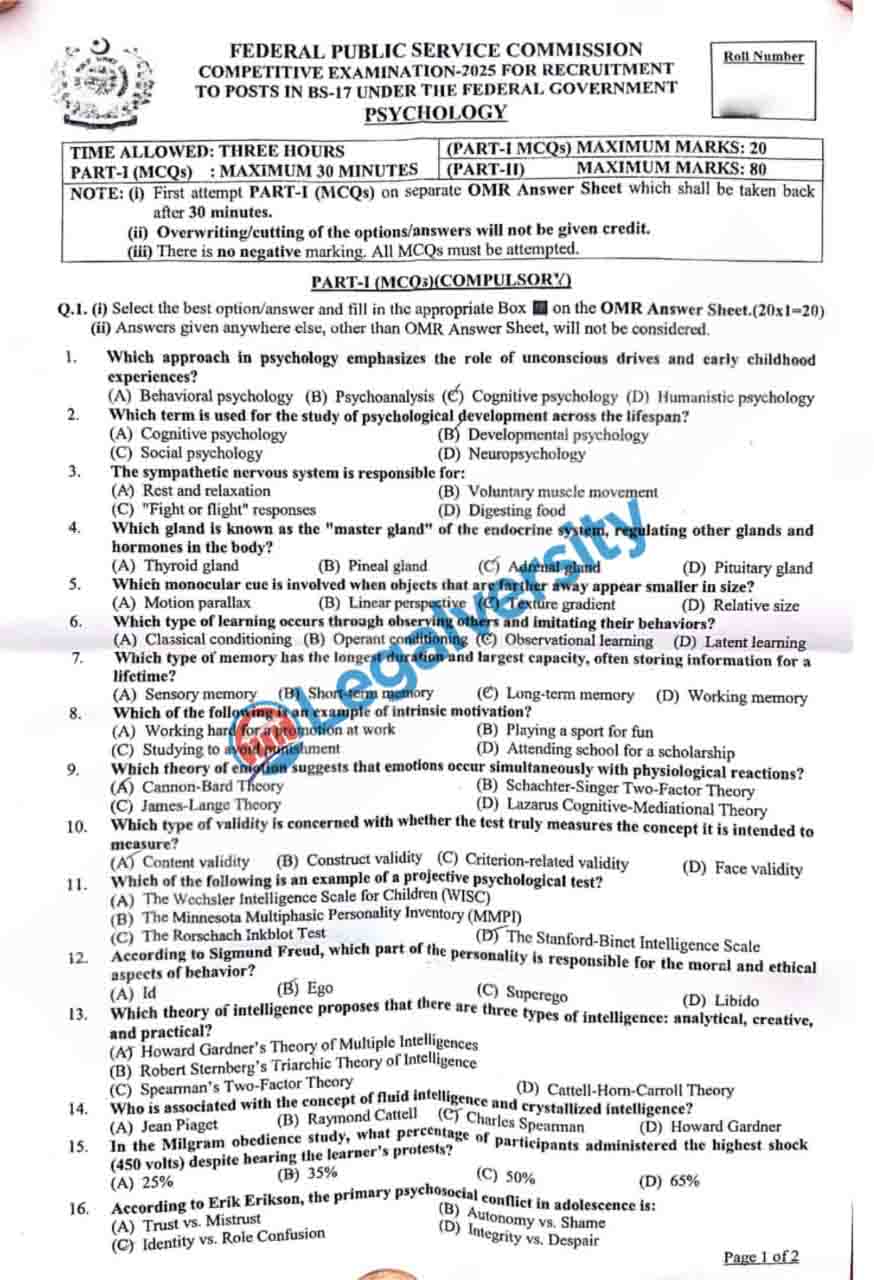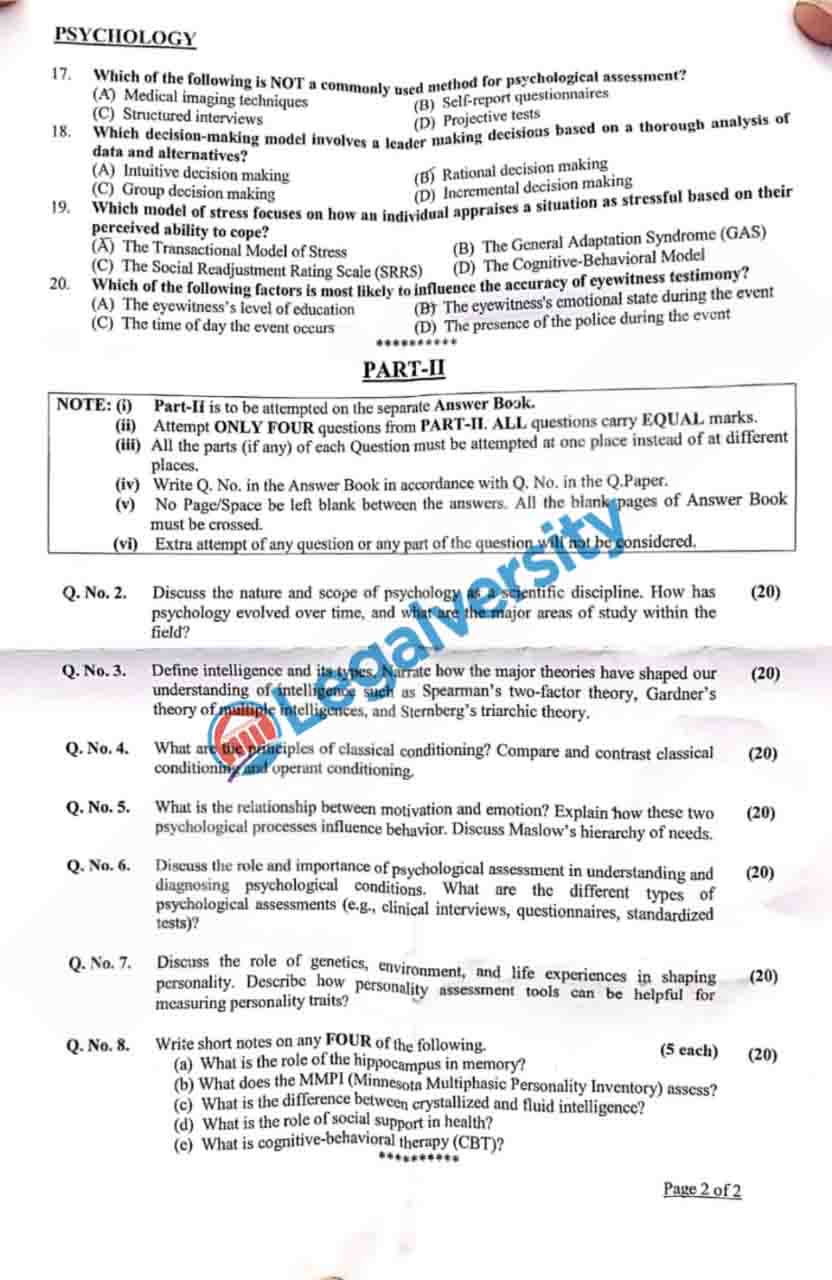The paper on Psychology is an optional subject in the CSS competitive examination 2025. Here, you will find the CSS Psychology past Paper 2025. I will also provide a summary of the paper, in which you will analyze what topics were given and how difficult they were. This lets you better understand the concept of paper and prepare well for future examinations.
CSS Psychology Past Paper 2025
Q1. Discuss the nature and scope of psychology as a scientific discipline. How has psychology evolved over time, and what are the major areas of study within the field?
Q2. Define intelligence and its types. Narrate how the major theories have shaped our understanding of intelligence such as Spearman’s two-factor theory, Gardner’s theory of multiple intelligences, and Sternberg’s triarchic theory
Q3. What are the principles of classical conditioning? Compare and contrast classical conditioning and operant conditioning.
Q4. What is the relationship between motivation and emotion? Explain how these two psychological processes influence behavior. Discuss Maslow’s hierarchy of needs.
Q5. Discuss the role and importance of psychological assessment in understanding and diagnosing psychological conditions. What are the different types of psychological assessments (e.g. clinical interviews, questionnaires, standardized tests)?
Q6. Discuss the role of genetics, environment, and life experiences in shaping personality. Describe how personality assessment tools can help measure personality traits.
Q7. Write short notes on any FOUR of the following:
- What is the role of the hippocampus in memory?
- What does the MMPI (Minnesota Multiphasic Personality Inventory) Assess?
- What is the difference between crystallized and fluid intelligence?
- What is the role of social support health?
- What is cognitive-behavioral therapy (CBT)?
Critical Evaluation of the Paper
This psychology paper critically assesses the core concepts in cognitive, behavioral, and applied psychology, with applicants needing to exhibit scientific thinking, theoretical insight, and practical applications of psychological theories. It deals with core areas including intelligence, learning theories, motivation, personality, and psychological assessment, and it provides a comprehensive though general exploration of the topic.
The first question requires an in-depth discussion of psychology as a scientific field, from its historical development from philosophical origins to contemporary experimental and applied psychology. The candidates have to explain central paradigms (e.g., behaviorism, cognitive psychology, humanism, and neuroscience) with a focus on principal areas such as clinical psychology, cognitive psychology, social psychology, and developmental psychology. This question provides the ground for probing psychology as a developing discipline, with its emphasis on an empirical foundation.
The second question on intelligence calls for defining intelligence in the course of examining influential theories. Spearman’s two-factor theory, Gardner’s multiple intelligences, and Sternberg’s triarchic theory are various conceptualizations of intelligence, ranging from general intelligence (g-factor) to practical, analytical, and creative intelligence. Theories have to be critically evaluated by the candidates regarding their impact on educational policies, intelligence testing, and psychological research.
The difference between classical and operant conditioning (Q3) assesses behavioral learning theories knowledge. Applicants have to describe Pavlov’s classical conditioning principles and compare them to Skinner’s operant conditioning highlighting chief differences like involuntary vs. voluntary response, reinforcement, and punishment systems. An in-depth comparison of real-life applications like therapy, education, and behavior modification adds credibility to the answer.
The motivation and emotion question (Q4) investigates their relationship and influence on behavior. Applicants need to describe how emotions influence motivation and vice versa, using illustrations such as fear-inducing fight-or-flight behavior or achievement motivation affecting career goals. Maslow’s hierarchy of needs is an organized framework, detailing how human motivation unfolds from basic physiological to self-actualization needs.
Psychological testing (Q5) is an essential element in diagnosing and identifying mental health disorders. The question calls for the discussion of clinical interviews, standardized tests, personality inventories, and projective techniques and assessing their significance in clinical and organizational contexts. Candidates should cite instruments such as the MMPI, Rorschach test, and intelligence tests to validate their points.
The personality question (Q6) brings together genetic, environmental, and experiential factors in personality formation. The applicants need to discuss biological dispositions, social learning, and grand theories of personality (e.g., the Big Five Model, and Freud’s psychoanalytic theory) and touch upon personality measuring instruments such as the MBTI, NEO-PI-R, and projective tests.
The short notes question (Q7) guarantees coverage of central psychological concepts, such as memory processes, types of intelligence, health social support, and treatments such as CBT. The candidates are required to give clear but concise explanations, showing both theoretical insight and applied psychology knowledge.
In summary, this paper requires critical thinking, theoretical insight, and practical applications, testing the ability of a candidate to integrate historical approaches, current research, and real-world relevance in psychology.
View the CSS Psychology Past Paper 2025


Also read:
